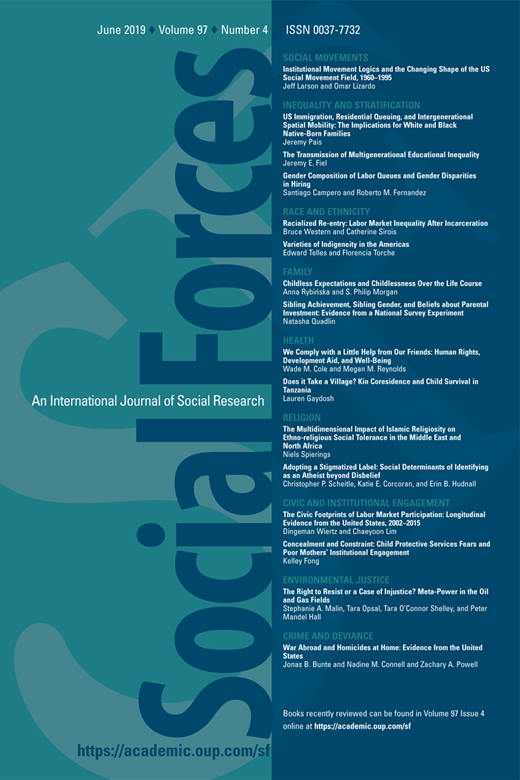Social Forces Current Issue
Review of “Dreams Achieved and Denied: Mexican Intergenerational Mobility”
Review of “Dreams Achieved and Denied: Mexican Intergenerational Mobility” By Robert Courtney Smith Russell Sage Foundation, 2024, 306 pages, price: $35.00 (paper). https://www.russellsage.org/publications/dreams-achieved-and-denied
Review of “Mothering in the Time of Coronavirus”
Review of “Mothering in the Time of Coronavirus” By Amy Lutz , Sujung (Crystal) Lee, and Baurzhan Bokayev University of Massachusetts Press, 2025, 160 pages, price: $99.00 (cloth) / $32.95 (paper). https://www.umasspress.com/9781625348364/mothering-in-the-time-of-coronavirus/
Review of “Get It Out: On the Politics of Hysterectomy”
Review of “Get It Out: On the Politics of Hysterectomy” By Andréa Becker New York University Press, 2025, 208 pages, price: $89.00 (cloth) / $28.00 (paper) / $28.00 (eBook). https://nyupress.org/9781479826605/get-it-out/
Review of “Against Abandonment: Repertoires of Solidarity in South Korean Protest”
Review of “Against Abandonment: Repertoires of Solidarity in South Korean Protest” By Jennifer Jihye Chun and Ju Hui Judy Han Stanford University Press, 2025, 322 pages, price: $130.00 (cloth) / $32.00 (paper) / $32.00 (eBook). https://www.sup.org/books/asian-studies/against-abandonment
Review of “A Mouse in a Cage: Rethinking Humanitarianism and the Rights of Lab Animals”
Review of “A Mouse in a Cage: Rethinking Humanitarianism and the Rights of Lab Animals” By Carrie Friese New York University Press, 2025, 224 pages, price: $89.00 (cloth) / $30.00 (paper). https://nyupress.org/9781479833481/a-mouse-in-a-cage/
Review of “Comprehensive Deterrence Theory: The Science and Policy of Punishment”
Review of “Comprehensive Deterrence Theory: The Science and Policy of Punishment” By Daniel P. Mears and Mark C. Stafford Cambridge University Press, 2025, 285 pages, price: $125.00 (cloth) / $41.99 (paper) / $41.99 (eBook). https://www.cambridge.org/us/universitypress/subjects/sociology/criminology/comprehensive-deterrence-theory-science-and-policy-punishment?format=HB&isbn=9781009592741
Review of “The Politics of Unpaid Labour: How the Study of Unpaid Labour Can Help Address Inequality in Precarious Work”
Review of “The Politics of Unpaid Labour: How the Study of Unpaid Labour Can Help Address Inequality in Precarious Work” By Valeria Pulignano and Markieta Domecka Oxford University Press, 2025, 320 pages, price: $130.00 (cloth). https://global.oup.com/academic/product/the-politics-of-unpaid-labour-9780198888130?cc=ph&lang=en&#
Review of “Happy Meat: The Sadness and Joy of a Paradoxical Idea”
Review of “Happy Meat: The Sadness and Joy of a Paradoxical Idea” By Josée Johnston, Shyon Baumann, Emily Huddart, and Merin Oleschuk Stanford University Press, 2025, 320 pages, price: $130.00 (cloth) / $32.00 (paper) / $32.00 (eBook). https://www.sup.org/books/sociology/happy-meat
Review of “Crime Wave: The American Homicide Epidemic”
Review of “Crime Wave: The American Homicide Epidemic” By James Tuttle New York University Press, 2025, 224 pages, price: $89.00 (cloth) / $29.00 (paper) / $29.00 (eBook). https://nyupress.org/9781479831166/crime-wave/
Review of “Expelling Public Schools: How Antiracist Politics Enable School Privatization in Newark”
Review of “Expelling Public Schools: How Antiracist Politics Enable School Privatization in Newark” By John Arena University of Minnesota Press, 2023, 360 pages, price: $120.00 (cloth) / $30.00 (paper) / $30.00 (eBook). https://www.upress.umn.edu/book-division/books/expelling-public-schools
Review of “White-Collar Blues: The Making of the Transnational Turkish Middle Class”
Review of “White-Collar Blues: The Making of the Transnational Turkish Middle Class” By Mustafa Yavaş Columbia University Press, 2025, 336 pages, price: $140.00 (cloth) / $35.00 (paper) / $34.99 (eBook). https://cup.columbia.edu/book/white-collar-blues/9780231559935/
Review of “Man Up: The New Misogyny and the Rise of Violent Extremism”
Review of “Man Up: The New Misogyny and the Rise of Violent Extremism” By Cynthia Miller-Idriss Princeton University Press, 2025, 344 pages, price: $29.95 (cloth) / $29.95 (eBook). https://press.princeton.edu/books/hardcover/9780691257549/man-up?srsltid=AfmBOoocoPFgRShcsxPCvOXFVz1oFxsF4otz71AA5St3RcKyDTRmA_io
Review of “The Loyalty Trap: Conflicting Loyalties of Civil Servants Under Increasing Autocracy”
Review of “The Loyalty Trap: Conflicting Loyalties of Civil Servants Under Increasing Autocracy” By Jaime Lee Kucinskas Columbia University Press, 2025, 440 pages, price: $120.00 (cloth) / $30.00 (paper) / $29.99 (eBook). https://cup.columbia.edu/book/the-loyalty-trap/9780231208154/
Review of “By the Power Vested in Me: How Experts Shape Same-Sex Marriage Debates”
Review of “By the Power Vested in Me: How Experts Shape Same-Sex Marriage Debates” By Michael Stambolis-Ruhstorfer Columbia University Press, 2025, 344 pages, price: $140.00 (cloth) / $35.00 (paper) / $34.99 (eBook). https://cup.columbia.edu/book/by-the-power-vested-in-me/9780231202237/
Review of “Brothers in Grief: The Hidden Toll of Gun Violence on Black Boys and Their Schools”
Review of “Brothers in Grief: The Hidden Toll of Gun Violence on Black Boys and Their Schools” By Nora Gross The University of Chicago Press, 2024, 256 pages, price: $ 27.50 (cloth) / $ 26.99 (eBook). https://press.uchicago.edu/ucp/books/book/chicago/B/bo236189018.html
Review of “Black Culture, Inc. How Ethnic Community Support Pays for Corporate America”
Review of “Black Culture, Inc. How Ethnic Community Support Pays for Corporate America” By Patricia A. Banks Stanford University Press, 2022, 240 pages, price: $26.00 (cloth) / $24.00 (paper) / $24.00 (eBook). https://www.sup.org/books/title/?id=30194
Review of “Civil Repair”
Review of “Civil Repair” By Jeffrey C. Alexander Polity Press, 2025, 224 pages, price: $69.95 (cloth) / $24.95 (paper) / $20.00 (eBook). https://www.politybooks.com/bookdetail?book_slug=civil-repair--9781509506446
Review of “Who Pays for Diversity?: Why Programs Fail at Racial Equity and What to Do about It”
Review of “Who Pays for Diversity?: Why Programs Fail at Racial Equity and What to Do about It” By Oneya Fennel Okuwobi University of California Press, 2025, 272 pages, price: $95.00 (cloth) / $29.95 (paper) / $27.95 (eBook). https://www.ucpress.edu/books/who-pays-for-diversity/epub-pdf/9780520392229
Review of “Freedom Train: Black Politics and the Story of Interracial Labor Solidarity”
Review of “Freedom Train: Black Politics and the Story of Interracial Labor Solidarity” By Cedric de Leon, University of California Press, 2025, 352 pages, price: $95.00 (cloth) /$29.95 (paper) / $29.95 (eBook). https://www.ucpress.edu/books/freedom-train/epub-pdf
Review of “No God but Man: On Race, Knowledge, and Terrorism”
Review of “No God but Man: On Race, Knowledge, and Terrorism” By Atiya Husain, Duke University Press, 2025, 208 pages, price: $102.95 (cloth) / $26.95 (paper). https://www.dukeupress.edu/no-god-but-man
Social Forces
Established in 1922, Social Forces is recognized as a global leader among social research journals. Social Forces publishes articles of interest to a general social science audience and emphasizes cutting-edge sociological inquiry as well as explores realms the discipline shares with psychology, anthropology, political science, history, and economics. Social Forces is published by Oxford University Press in partnership with the Department of Sociology at the University of North Carolina at Chapel Hill.


